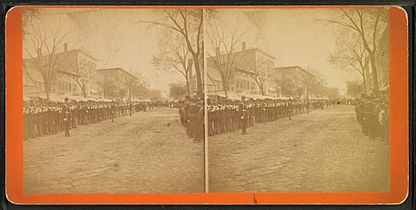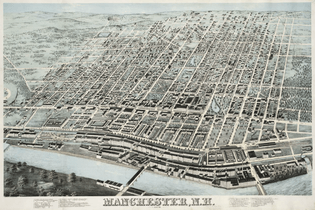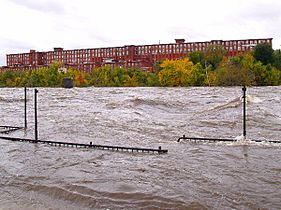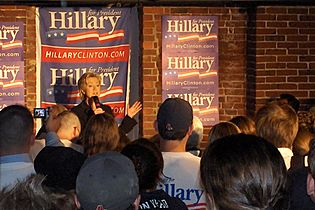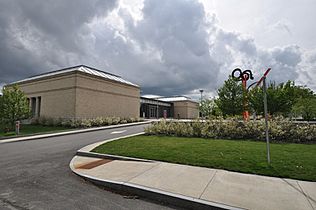Timeline of Manchester, New Hampshire facts for kids
This is a timeline showing important events in the history of Manchester, a city in New Hampshire, United States. A timeline helps us see how a place has changed and grown over many years!
Early Days (Before 1800s)
- 1722 – A man named John Goffe settles in a place called Old Harry's Town. This was in the British area known as the Province of New Hampshire.
- 1723 – A small cabin was built, and slowly, more people came to live there.
- 1727 – The area was officially named Tyngstown.
- 1736 – The very first sawmill was built, which helped cut wood for buildings.
- 1751 – Tyngstown got a new name: "Derryfield."
- 1788 – New Hampshire officially became one of the states in the United States.
- 1796 – The Derryfield Social Library was started, giving people a place to read books.
The 1800s: Growth and Industry
- 1807 – A canal was built by Samuel Blodgett. Canals helped boats move goods easily.
- 1810
- Derryfield was renamed "Manchester." This new name was chosen because it sounded like Manchester, England, a famous industrial city.
- The Amoskeag Cotton & Woolen Manufacturing Company was officially started. This company would become very important for the city.
- 1823 – The population of Manchester was 761 people.
- 1839
- The Amoskeag Representative newspaper started printing the news.
- The First Congregational Society and the First Baptist Church were officially formed.
- 1840 – The population grew a lot, reaching 3,235 people!
- 1841
- The First Unitarian Church was built.
- Valley Cemetery was created.
- 1842 – Ann Bamford began helping people escape slavery through the Underground Railway.
- 1844 – The Manchester Athenaeum was set up, which was a place for learning and culture.
- 1846
- Manchester officially became a city!
- Manchester High School was established, offering education to older students.
- 1849 – The Manchester and Lawrence Railroad started running, making travel and trade easier.
- 1850
- The Manchester Daily Mirror newspaper began publication.
- The City Missionary Society was established to help people in need.
- 1851 – Manchester hosted the state fair, bringing many visitors to the city.
- 1852 – The Manchester Gas Light Co. was started, providing gas for lighting homes and streets.
- 1854
- The Manchester City Library was established, giving more people access to books.
- The Manchester Locomotive Works was formed, building powerful train engines.
- 1860 – The population continued to grow, reaching 8,841 people.
- 1863 – The Union Leader newspaper, which is still around today, began publishing.
- 1869
- Manchester became the main city for Hillsborough County.
- The Cathedral of St. Joseph was founded.
- St. Joseph Cemetery opened.
- 1870 – The population jumped to 23,509 people!
- 1874 – The Ash Street School was built.
- 1880 – The population reached 33,592.
- 1889 – Saint Anselm College was established nearby in Goffstown.
- 1890 – The population was 44,126.
- 1890 – Elliot Hospital was founded, providing important healthcare for the community.
- 1892
- The Beech Street Grounds baseball stadium opened for games.
- Sacred Heart Hospital was founded.
- 1893 – Stark Park was officially opened to the public.
- 1895 – The Manchester Historical Association was established to preserve the city's history.
- 1897 – The Weston Observatory was built, used for looking at the stars.
- 1898 – The Manchester Institute of Arts and Sciences was founded.
- 1900 – The population grew to 56,987 people.
The 1900s: Modern Times
- 1906 – The Strand Theatre opened in the old Opera House building.
- 1910
- The population reached 70,063.
- Manchester celebrated its 100th birthday as a city!
- 1912 – The Empire Theater was built.
- 1913 – Textile Field sports stadium was built.
- 1914 – The Palace Theatre and a new Public Library building were completed.
- 1922 – Manchester Central High School was renamed, adding "Central" to its name.
- 1923 – Manchester High School West was established, giving students another high school option.
- 1927 – Manchester Airport was established, connecting the city by air.
- 1929 – The Currier Gallery of Art was founded, showcasing beautiful artworks.
- 1932 – The New Hampshire School of Accounting and Secretarial Science was founded. Today, it's known as Southern New Hampshire University.
- 1935 – The huge Amoskeag Mills closed down. This was a big change for Manchester.
- 1942 – Grenier Army Airfield was dedicated, playing a role in World War II.
- 1945 – The State Trade School at Manchester was founded.
- 1950 – The Zimmerman House was designed by the famous architect Frank Lloyd Wright.
- 1954 – WMUR began broadcasting, bringing television to the area.
- 1960 – Manchester Memorial High School opened.
- 1963 – The John F. Kennedy Memorial Coliseum opened, a place for sports and events.
- 1964 – The Derryfield School was established.
- 1966 – Grenier Air Force Base closed.
- 1971 – McIntyre Ski Area opened, offering winter fun.
- 1973 – The Manchester Transit Authority was founded, helping people get around the city by bus.
- 1977 – The Mall of New Hampshire opened, a popular shopping center.
- 1980 – The population reached 90,936.
- 1985 – The University of New Hampshire at Manchester was established, offering higher education.
- 1988 – Manchester became a "sister city" with Taichung, Taiwan, building friendships between cities.
- 1992 – Manchester also became a sister city with Neustadt an der Weinstraße, Germany.
- 1998 – The city's website went online, making information easily available.
- 1999 – Robert A. Baines became the mayor of Manchester.
The 2000s: New Millennium
- 2000
- The Massachusetts College of Pharmacy and Health Sciences opened a campus in Manchester.
- Holy Family Academy was established.
- 2001
- The Civic arena opened, hosting concerts and sports.
- The Hippo newspaper began publication.
- 2005
- Fisher Cats Ballpark opened, home to a baseball team.
- Segway Fest was held, celebrating the unique personal transporters.
- 2006 – The Manchester Daily Express newspaper began publication.
- 2010
- Ted Gatsas became mayor.
- The population reached 109,565 people.
- 2018 – Joyce Craig became mayor.
- 2024 – Jay Ruais became mayor.
Images for kids
-
The Merrimack River during a flood in 2005
-
Candidate Hillary Clinton visiting Manchester in 2007
-
The Currier Museum after its renovation in 2008

All content from Kiddle encyclopedia articles (including the article images and facts) can be freely used under Attribution-ShareAlike license, unless stated otherwise. Cite this article:
Timeline of Manchester, New Hampshire Facts for Kids. Kiddle Encyclopedia.

